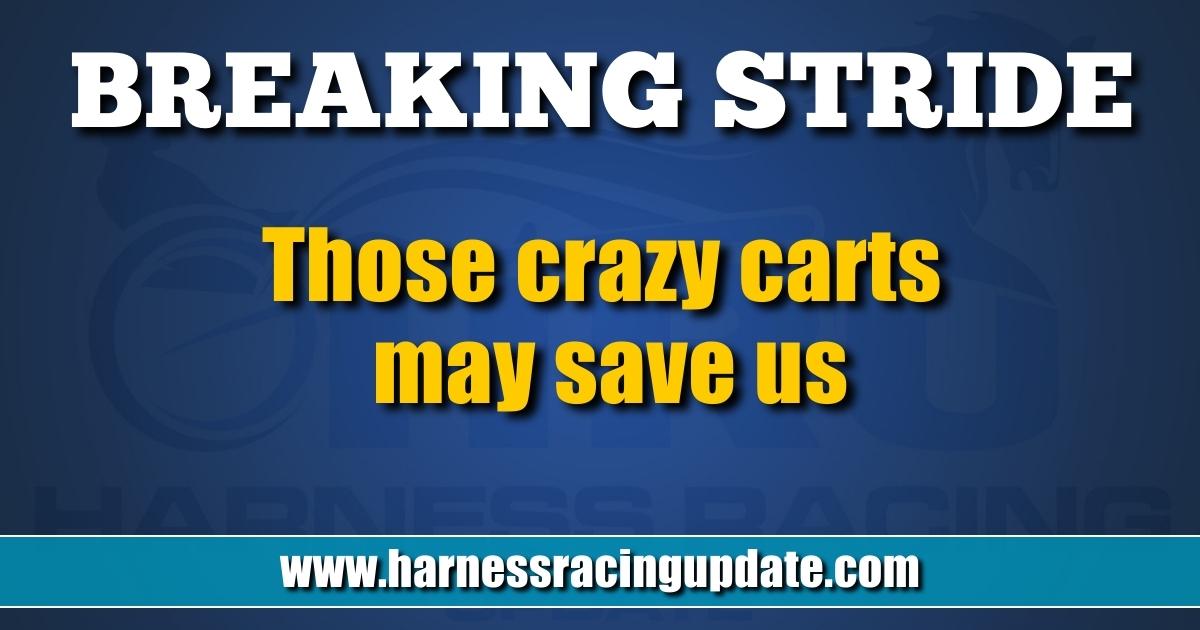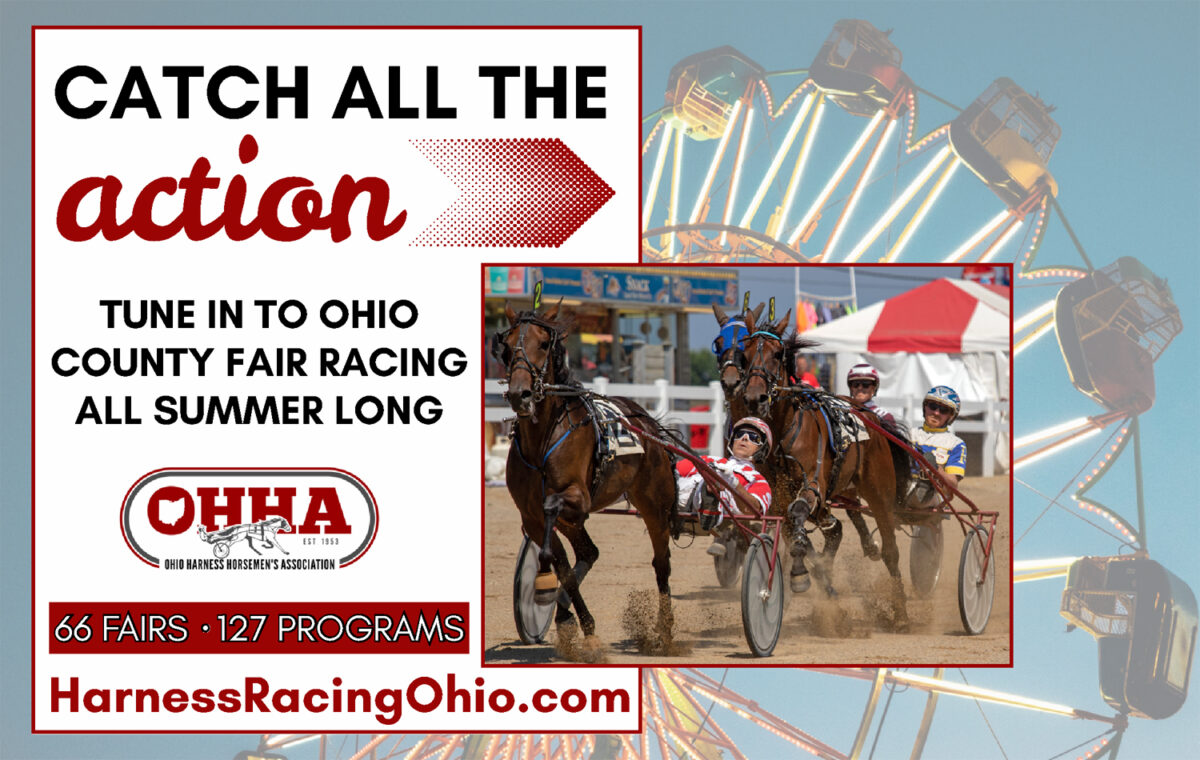Those crazy carts may save us
by Trey Nosrac
When you think you have Phil Montgomery pegged, he fools you. To look at him, you see a 30-ish, full-bearded grizzly bear in a flannel shirt who you would approach with caution, but Phil is a thoughtful Teddy Bear. When you discover he works as a long-haul trucker, you assume he spends his days listening to right-wing talk shows on the radio, but Phil tunes in because he finds it amusing how the hosts turn anything into controversy. And six years ago, when I asked him to buy into my annual trotter, he immediately said yes.
Phil and I meet every other month for the fish fry at the Bentleyville VFW Hall. We aren’t veterans, and most of our wars have been marital, but the VFW folks are great, and the beer is cheap. Beer brings out philosophical Phil, and we solve all the world’s problems together. Last night, by the third beer, he quoted Francis Bacon:
“Things alter for the worst spontaneously if they be not altered for the better designedly.”
After reciting this rehearsed spontaneous quote, Phil asked, “So, how did your trotter do this year?”
I placed my elbows on the table and dropped my head into my hands. “Remember the year you and Mark bought 25 per cent of a trotter yearling named Captain Plato with me?”
“Sure, Captain Plato, who you nicknamed Captain Plod-o. The horse never even make it to the races.”
“This year, my 2-year-old trotter was worse.”
“Worse, how is that possible?”
“More expensive at the sale.”
Phil let out a whoosh, shook his shaggy head, and said, “Trey, I admire your stamina. Every year, you climb back in the saddle.”
“And I appreciate that you never try to talk sense into me.”
“Nobody can talk sense into you. Plus, I know how much you enjoy it and can see how people get addicted. The year I dipped my toe in harness racing turned out to be, well, let’s say, it was interesting.”
“You want to try again?”
“NO.”
We moved on to the subject of truck driving, another ridiculous world with heroes, villains and a dark and bright side. Then, he surprised me when he emphatically stated, “Within five years, computers will drive long-haul trucks, and the trucks will be electric and the drivers will be robots.”
“No way.”
“Trust me. Technology will make this a done deal. It’s smarter, safer, cleaner and cheaper. I can’t muster a reasonable argument against the transition. The change is not a deep state or a subversive plot. The wheels of life turn. They will crush trucking. And I will need a new gig.”
I muttered, “I wonder what will happen in harness racing?”
Once again, philosophical Phil surprised me. “I’ve been thinking about that, yeah, yeah, I think about a lot of stuff on those miles between the east and west coast. I predict those carts the drivers sit in will be a HUGE asset in the long run.”
“What?”
“With all the new sports wagering competition, the gambling part of horse racing will take a beating, maybe dry up. Horse racing will become much more of a niche sport in the future, much more of a community.”
“Maybe, but what about the carts? And by the way, we call them sulkies or race bikes.”
“Consider this: At least a sliver, hopefully a large sliver, of people will continue to be fascinated with horses and racing. Racing horses will have a smaller footprint but won’t disappear. Here is what I think, my big prediction. Regular people like you and me can climb into a cart. We can’t, or shouldn’t, get aboard a thoroughbred. I see a horse racing world where more and more amateurs take the reins, and when that world takes hold, harness racing, with its lower costs, those carts will be a big plus. Those carts make your sport more accessible. You will have a big leg up.”
I slapped the table, “Phil, that’s happening! Amateurs are popping up all over the place in harness racing. Racetracks are writing a lot of racing cards with amateur races. I bet money on amateur races all the time. The unpredictable has always been my friend. I thought I was kooky for enjoying them, but I heard that the money wagered on these races is good. Honestly, amateur races should be good for everybody.”
Phil took a sip and nodded. “There you go. Now imagine the amateur side of your sport catches fire while the gambling engine sputters. People who love horses and racing, from all breeds, will have a place to land, play, and survive. Getting a head start recruiting them would be a damn good idea if your sport is heading to a great hobby instead of a bad gamble.”
I pulled on my Miller Lite, set the can down, and said, “You want to know my favorite race this year? Five women drivers at a fair track. I think they were amateurs, but I’m not sure. What a great race. What a great product. I’m telling you, if people watched or drove in that race, or if they sampled the joy of that competition, there would be interest.”
“Trey, my thinking is if I were a racetrack operator, ran a state harness racing program, or was an administrator, I would lean heavily into the amateur side of the game. There is a multiplier effect here. If Joe Smith finds raising and racing horses fun, bringing friends to watch HIM and HIS HORSE makes it much easier to spark interest. Think back to my ill-fated adventure with Captain Plato. If you were driving, or if I got in the sulky a few times, I might have tried again, and I might bring new people.”
I nodded. “Good point. Yeah, and new people do not need to fork over wads of cash right off the bat. They can catch the harness racing bug, purchase yearlings, and pay training bills.”
Phil nodded. “Every happy and engaged amateur becomes an ambassador, a salesperson. With the ability to be a participation sport, harness racing could carve out a nice niche.”
“Besides amateur racing, there should be a minor league of drivers and women’s divisions. If enough people actively participate, the sport can create all kinds of hands-on racing.”
Phil closed our discussion with a promise, “Trey, if you decide to hop into the cart and do some of the training, maybe some of the driving, I will get back in the game.”
We clinked beer cans.

















